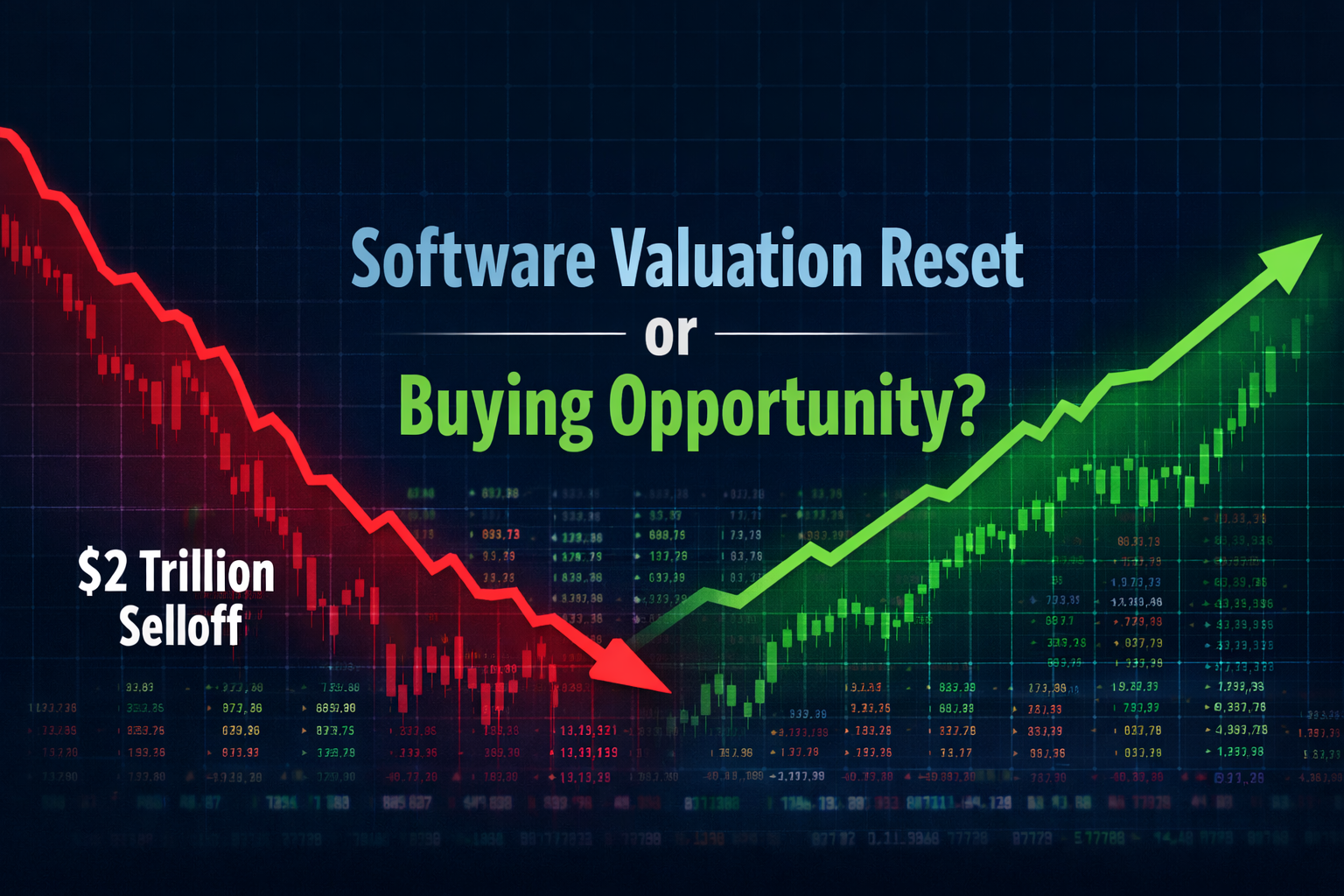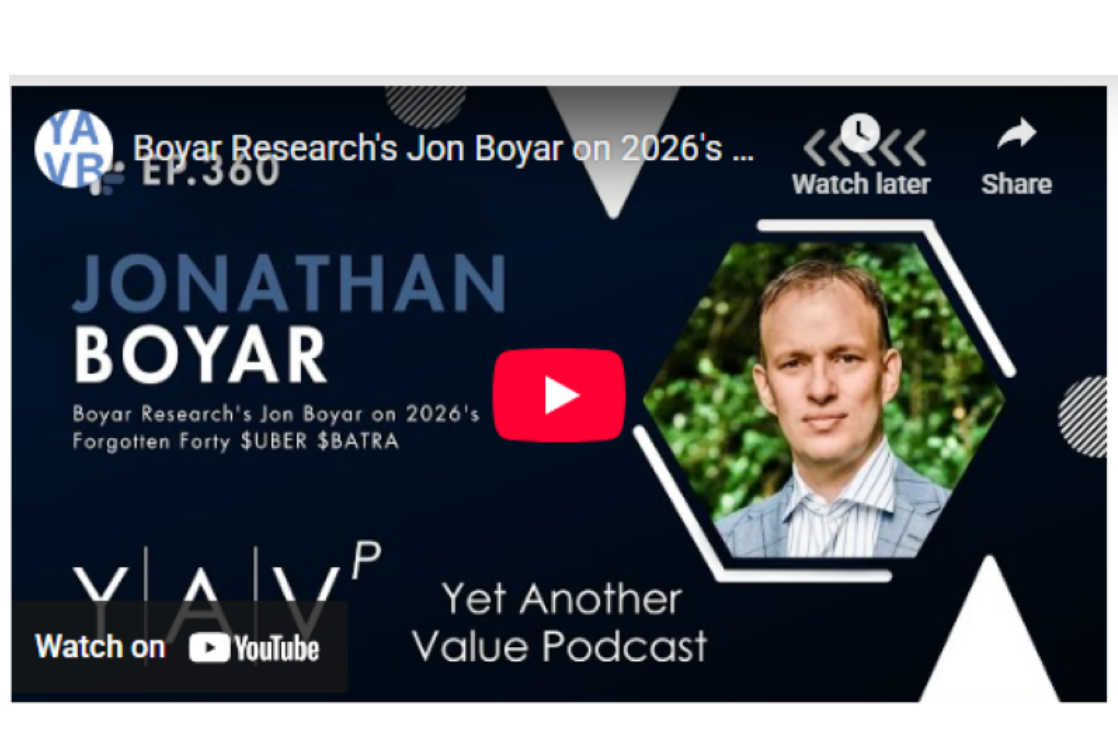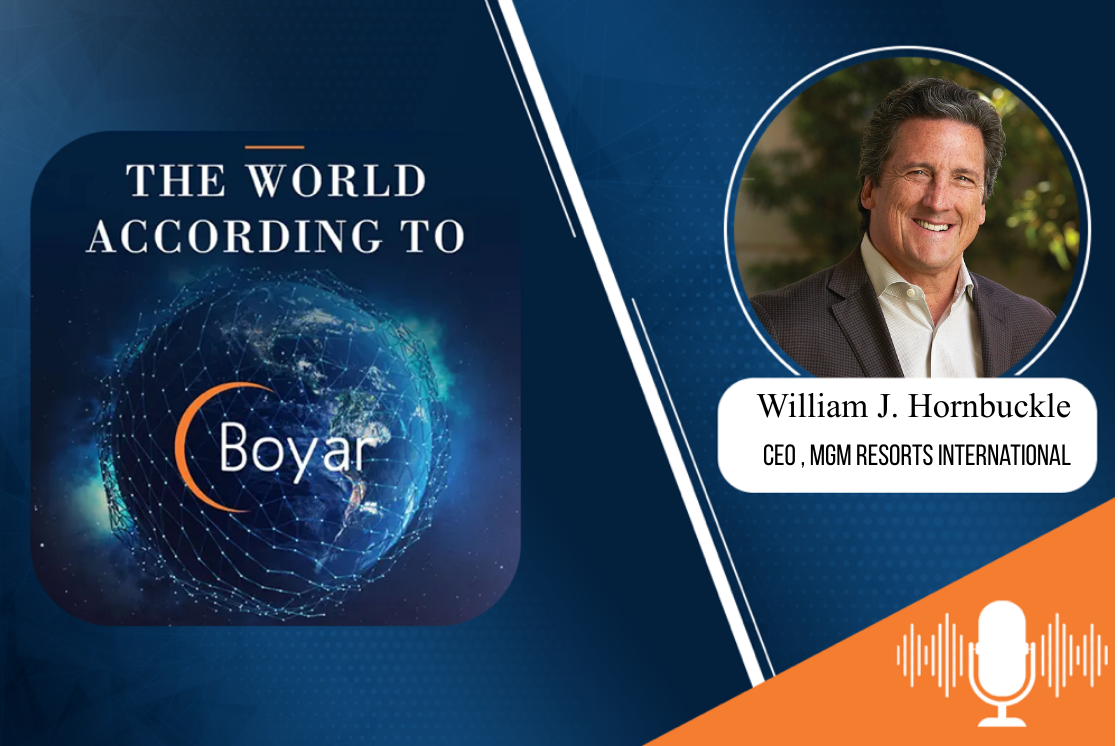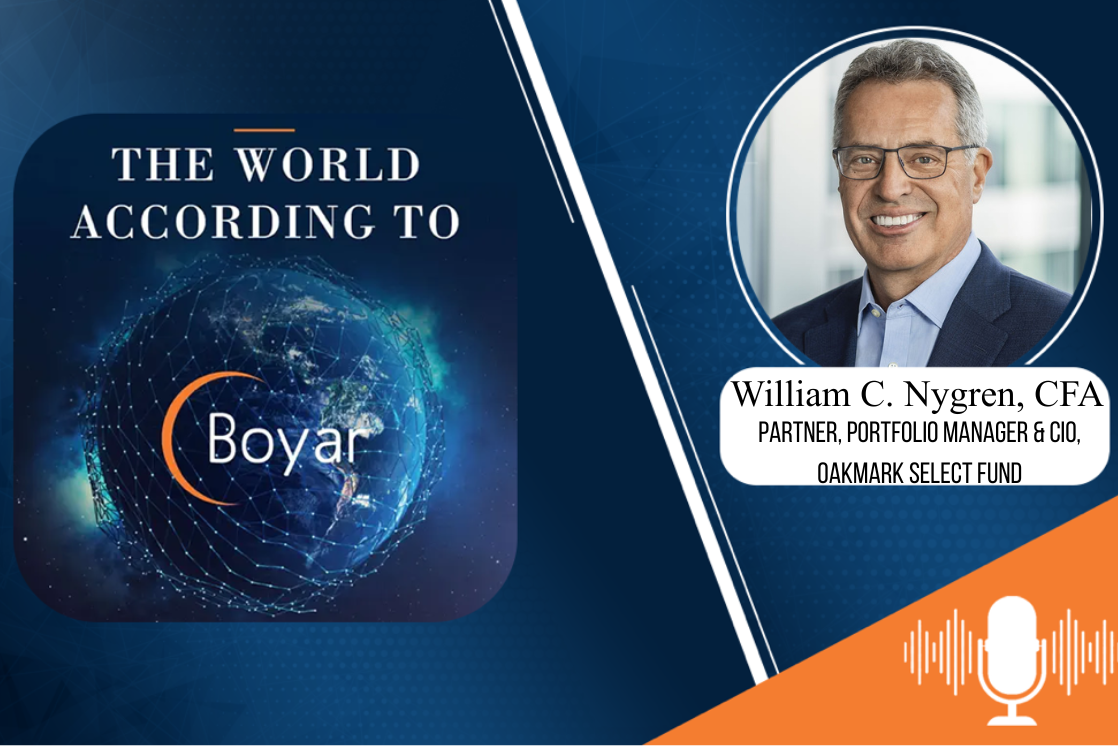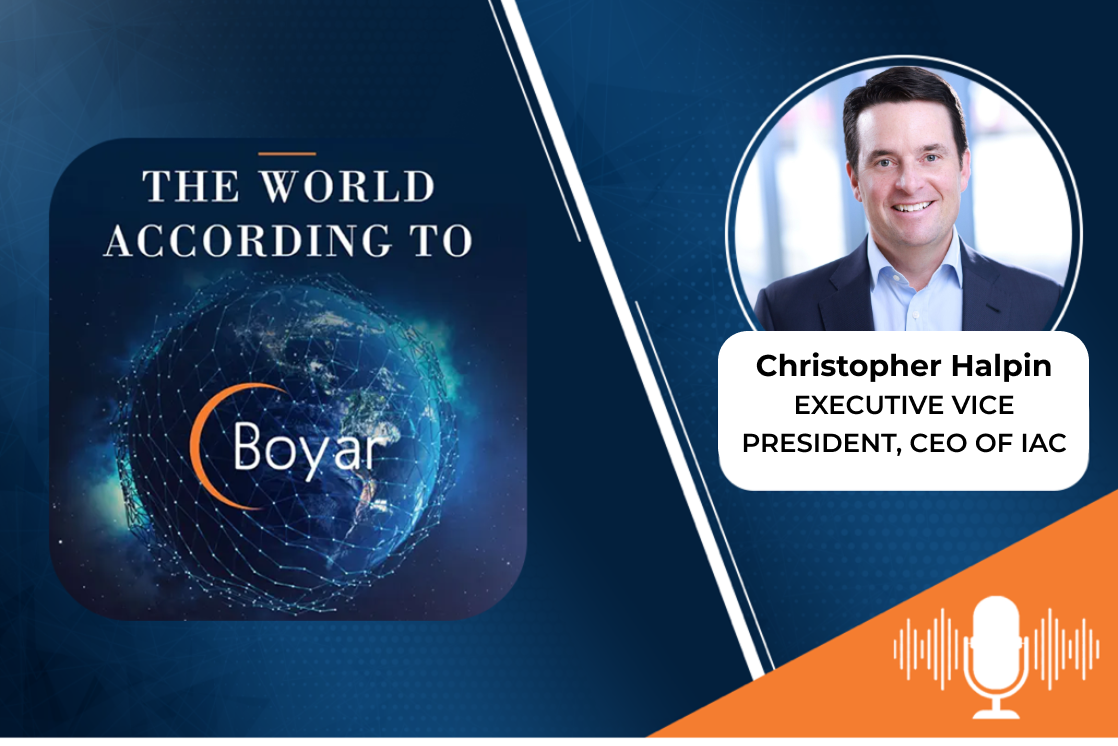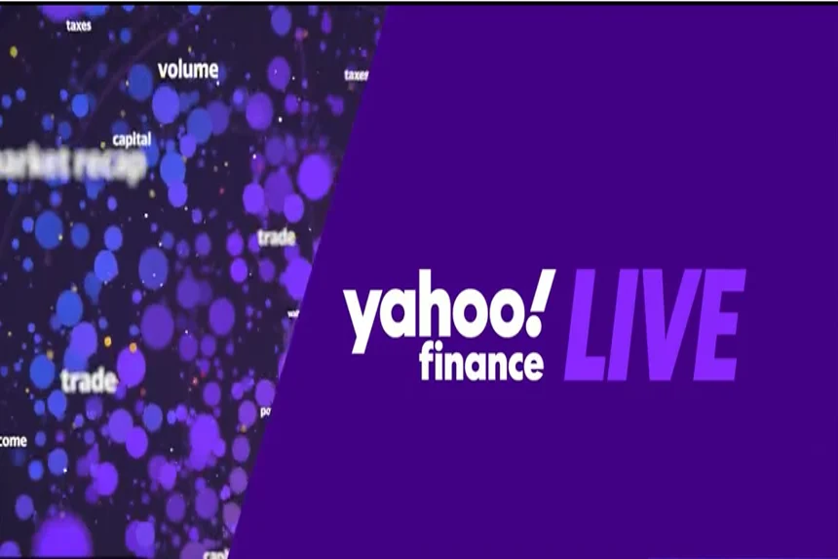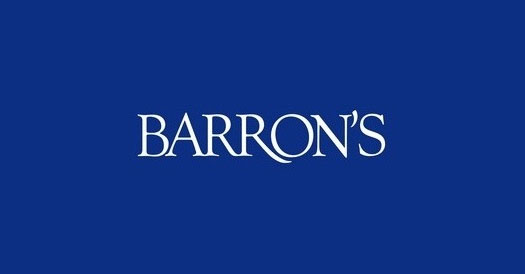Jonathan Boyar on GuruFocus’s Value Investing Live
Jonathan Boyar Discusses The Investment Case For Disney, Twitter, Madison Square Garden Sports/ Entertainment and Berkshire Hathaway - Boyar Value Group
Investors need to beware of false bargains, says Jonathan Boyar in a new CNBC interview - Boyar Value Group
Jonathan Boyar was on CNBC discussing his thoughts on the stock market and some of his top stock picks. - Boyar Value Group
Jonathan Boyar gave a presentation for GuruFocus’s Value Investing Live series.
Jonathan discusses:
- The Boyar Value Group’s investment philosophy
- How we uncover intrinsically undervalued companies
- The investment case for Madison Square Garden Entertainment & Madison Square Garden Sports
- Two household names he believes are currently selling at attractive valuations
Transcript of the Presentation:
[00:00:40.080]
All right, welcome, everyone, to Value Investing Live today, I’m pleased to welcome our guests, Jonathan Boyar. Jonathan is president of Boyar’s Intrinsic Value Research, an independent research boutique established in 1975 that counts some of the world’s largest sovereign wealth funds, hedge funds, mutual funds and family offices as subscribers. He is also a principal of the investment manager, which has been managing money utilizing a value orientated strategy since 1983. Mark Boyar started publishing independent equity research on intrinsically undervalued companies in 1975, which led to the establishment of Boya Asset Management in 1983.
[00:01:21.480]
Defining intrinsic value as the amount paid to stockholders of a business is liquidated or sold. Boyar Asset Management remains true to Mark’s vision by specializing in equity securities of intrinsically undervalued companies. Their analysis of financial statements is driven by economic reality, and clients see profits as the markets reflect true value. As always, to all of our viewers out there, please feel free to post your questions and comments in the chat throughout the presentation. But keep in mind we will hold all of them until we hit the Q&A there at the end.
[00:01:53.940]
And without further ado, I’ll go ahead and hand things over to Jonathan so we can begin his presentation. Thank you, Graham. Much appreciated. And thank you to yourself and Charlie for inviting me. It’s always an honor. I know I spoke a few years ago at the Guru Focus conference and, you know, I was supposed to speak this year live, but obviously that got derailed due to the coronaviruses. But I truly hope to be there next year when things hopefully get back to some semblance of normalcy.
[00:02:29.130]
So I guess let’s start the title, my presentation, the Dolan Discount Opportunity or Value Trap? plus other opportunities. So I guess before starting this presentation can be downloaded by going to the website address on the bottom left hand of the screen. We’ll also be posting you always can follow us on Twitter @ Boyarvalue. So in today’s presentation, I’m really going to do three things one, give a brief background on the Boyar value group to discuss how we identify intrinsically undervalued companies.
[00:03:10.500]
And then talk about two Dolan controlled entities that, in our opinion, are selling at significant discounts to our estimate of intrinsic value, as well as to other companies that are household names that we currently find attractive. So here’s the for the lawyers, full disclosure of both myself. My clients own shares in all the companies I present today. I don’t think you would want it any other way. So who is the Boyar Value Group? This is a family run firm, it was founded by my father, Mark, in 1975.
[00:03:44.770]
To really be a research team looking at intrinsic companies through a different lens, what would a knowledgeable acquire pay for the business as opposed to what is a given company going to earn next quarter or next year?
[00:03:59.680]
And we’ve morphed into really two businesses. We have a research division where we sell our research on a subscription basis. We also have a money management division where we manage money for both individuals and institutions, large insurance companies, all sorts of different vehicles utilizing this really in-depth research. So we just kind of two sides of the house that are that are related. So first for your research, as Graham mentioned earlier, we have an institutional research service, we have some very interesting clients, I would say some of the world’s leading investors or clients of ours.
[00:04:43.770]
And it’s something we’re quite proud of. And we think, quite frankly, this gives us makes us better investors. And then we, as I said earlier, utilize these ideas for our Boyar Asset Management clients, include family offices, large institutions, and manage money through both pooled investment vehicles and separately managed accounts. So that’s a just a brief background on the organization, but what about the approach? How do we invest money and how are we different?
[00:05:18.270]
I think we’re quite unique. We consider ourselves businessmen trying to buy the proverbial dollar for 50 cents. We look at every company through the lens of an employer. A father is instilled in this into me since I was a little kid, that I’ve lived with this my whole life. If a company’s share price sells at a significant discount to what it’s worth over a reasonable period of time and I emphasize reasonable, the stock market will either reflect the true value of the company or an acquirer will.
[00:05:57.370]
So that’s why we look at everything through that lens, because we think it’s very, very helpful and it’s different than what traditional Wall Street does, where they just slap a multiple on a on a name. So we essentially take a private equity approach to public market investing. So people ask me, how do we come up with our stock ideas? We have a variety of ways that we uncover value which go over briefly in a moment. I’ll just go through each of these quickly.
[00:06:32.250]
The business value approach is one method. Wall Street has a way of making industries the flavor of the day, making stocks in that industry soar to ridiculously high heights and then go as high as they get. They get just as low. And that’s where we get involved. We Wall Street will sell indiscriminately. If a company is associated with a given industry, what we do is we look for industries that are out of favor that we think have long term potential to avoid value traps and look at the companies with the most competitive advantages, the best balance sheets and for valuation purposes.
[00:07:15.210]
What if similar companies been acquired for in the recent past? So that’s that’s one method. The hidden asset approach is probably my favorite method and one that we do utilize, and one of the reasons I like it so much is no computer screen in the world can replicate what we are doing. The only way to do this is just through rolling up your sleeves and doing your own due diligence.
[00:07:48.720]
So what is the hidden asset method? Accounting rules require the depreciation of certain assets that in fact often increase in value over time. So this leads to companies selling for significantly below them what they’re worth. And the best way to illustrate this is by an example. I’ve heard this story a thousand times by my father. This was the first stock or one of the first stocks we ever profiled in our research service, Tiffany and Company. So in 1975, when we started, you could have bought entire Tiffany franchise for twenty four million dollars.
[00:08:28.350]
The building it owned on 57th Street and Fifth Avenue, even during the depressed 1970s, was worth significantly more than twenty four million dollars. So you were essentially getting the business at less than zero cost, but the balance sheet couldn’t reflect this and the stock price languished. And we knew over time if we could stay the course, we would be fine. And you would realize and a few years later, Avon, which at the time was a highflyer, came in and paid a very handsome price for that for the company.
[00:09:06.930]
So that’s just a brief overview of the hidden asset method. The franchise approach is another area we love great consumer franchises, especially when they’re masked by corporate name. Believe it or not, this leads to valuation discrepancy because when you have a corporate name, people just put it kind of in the too art category or just ignore it. And the best example is one that we’ve recently or the last year or two profiled has done quite well for clients called Acushnet.
[00:09:43.540]
And probably half of you have no idea where Acushnet does, because it’s just so a corporate name, but they own Titlist golf balls and foot joint golf clubs. And you have to look at things through the lens of a portfolio manager and they see a Acushnet go across their stream screen and they.
[00:10:00.330]
Kind of might ignore it, but if the name of the company was title lists or whatever, the valuation discrepancy might type. So this seems very simplistic.
[00:10:12.630]
But believe it or not, it works. Fallen angels are another area that we like looking at, like looking at the once darlings of Wall Street that are now unwanted and unloved, just like in the business value method. Wall Street has a way of making stocks go to dizzying heights and then having them fall to levels that are just ridiculous. What we do is when that happens, we look at the business, we look, is this a sustainable business?
[00:10:44.910]
Is this a value trap? Is there something behind it? And if it is, it’s something that we might profile and eventually buy for clients. We also like looking at special situations, spin offs, or have been a fertile hunting ground for us. We like looking at companies post-bankruptcy as you can usually get things on the cheap that way, but not all spin offs are created equal. You have to be very, very careful and figure out why is a company spinning off a division?
[00:11:18.120]
We actually, a year or so ago did a comprehensive report discussing, you know, why spin offs over the last 10 years or so have significantly underperformed the market. But if you looked at certain factors, you could find success, potentially successful spin offs.
[00:11:39.620]
So our methodology, the business value method, fallen angels, special situations, that’s just the starting point. Equally important is a catalyst or a trigger. If a stock is simply just cheap, it can stay that way for a long time. That’s why you need a cabinet. You need to find the catalyst. Otherwise you’re going to fall to that value trap, which is what so many value. Investors make that mistake. So every time we come up with an idea, we have to come up with a story, a reason why is that stock going to go up over a reasonable period of time?
[00:12:19.220]
Barron’s once called my father Mark, the world’s most patient investor. I might not be as patient as him, but I’m pretty close and we’re willing to wait two, three, four years for our thesis to pan out, which I think gives us a competitive advantage. So what are our other competitive advantages? There’s a lot of money management firms out there. There’s a lot of research boutiques. What makes us different? I think the most important is our proprietary research publications, we sell for a lot of money to institutions, high net worth individuals, et cetera, comprehensive research reports, really, really deep dives that get sent to some in our, in my opinion, some of the world’s best investor.
[00:13:09.840]
And they’re not afraid to tell us when we’re wrong or to push back on our theories or our thesis, and that back and forth I think really helps us. Also, having to constantly come up with new ideas for our subscribers is really helpful. A lot of money managers run into the trap of just recycling their old ideas because we’re paid to come up with new ideas. We have to be fresh. We have to be on top of our game and constantly come up with these with these new with these new names.
[00:13:46.720]
Another competitive advantage for us is we invest in areas of the market that we’re under followed in industries that are out of favor, and we think these overall and micro-cap stocks and we have a separate microcap service called Boyar’s Microcap Focus, which has been extremely successful. We believe these overlooked areas of the market offer the greatest opportunities for outsized long-term returns. Things will be lumpy, of course, value investing certainly is currently out of favor, but we think over the long period of time this is a sound investment strategy.
[00:14:30.840]
We stood the test of time. My father started the business in the late 60s, started our firm in 1975, he still very much involved in the day to day operations of our business. And we’ve gone through terrible periods of time and persevered and survived. And company came out stronger on top. And we see no reason why this time will be different. And we’ve established a terrific team of seasoned analysts, investment professionals that have a diverse background, diverse skill sets, and I think one of the things that makes us different is we’re all generalists.
[00:15:12.310]
We’re all free to come up with ideas regardless of market cap, regardless of sector. And I think that gives us another competitive advantage, because sometimes there’s reasons to ignore, completely ignore a sector. And if you’re an energy analyst at a particular firm and there’s nothing to buy in energy, you’re just trying to justify your existence there. Our clients are our employees are our team members are free to come up with any idea, any market cap, any sector.
[00:15:46.990]
And we’ve done quite well by our research clients, which translates to our many of the ideas we publish, we buy for our money management clients, as you can see, I don’t want to toot our own horn, but we’ve done quite well both on the Boyar Microcap Focus and our traditional all cap product Asset Analysis Focus. Obviously, past performance is no guarantee of future results, as our lawyers make us say. But it’s you know, this is how we’ve done.
[00:16:21.130]
So now I’m just going to start talking about stock markets, as I mentioned, and we’re talking about the MSG complex and then talk about two other ideas that are more household names. Anyone who’s a Knick fan must think I’m crazy to want to invest in this company are controlled by the Dolan family. However, we have a very different view of the dolphins than most people, we’ve actually found them to be great people to invest alongside with. We’ve been following them a long time, as we wish we were shareholders in Cablevision.
[00:16:56.780]
And the Dolans tried to take the Cablevision private and admit to thousands, but the minority shareholders blocked them and thankfully they did. As since then, the Dolans unlocked a lot of value for shareholders. And one of the things that they did was spin out Madison Square Garden. And because of the valuation and the great assets that they owned, we decided to feature it in our February 2010 issue of our all cap research service. At the time of the spin off, MSG, had a lot of issues that were worrying investors and not too similar.
[00:17:37.070]
Today, the Knicks were terrible. Same as today. Then there was the possibility of an NBA strike and people were worried about heavy capital expenditures as they were upgrading the company’s flagship arena, Madison Square Garden. So there were lots of worries and it was greeted with skepticism. And that’s what gave us the opportunity as we saw fantastic assets. And as I mentioned before, you know, Wall Street doesn’t particularly like the Dolans, and they’ve been terrible if you’re a Knick or Ranger fan, but as a shareholder, we’ve been quite happy with them.
[00:18:19.310]
When they when they controlled Cablevision, they had an industry leading dividend, paid a large special dividend, and they eventually ended up selling Cablevision to Altice at a price we never thought they would get. So that also demonstrates to us that they’re willing to part with assets and both. And we think one or both of Murphy and MSG’s could potentially be sold. The value of sports teams have exploded and you can see the value of the Knicks in 2009 compared to today, and the Rangers have gone up significantly over time.
[00:19:05.950]
And that’s for a variety of reasons, doing with the value of sports media rights and now sports gambling, which is a huge opportunity for them. So that’s part of the valuation. And I know it sounds strange to use the Forbes value, but that’s actually utilized quite heavily when during sports transactions. So here’s the current opportunity in April of this year, Madison Square Garden, which separated into two companies, Madison Square Garden Sports and MSG Entertainment, both of which, in our opinion, are trading significantly less than our assessment of their intrinsic value.
[00:19:52.470]
The Dolans control both entities through super voting shares, and while many people are hesitant to go into dual class shares, we think if you have the right partner, it’s something you can live with or we can live with. And oftentimes it gives you the opportunity to buy shares cheaply. So what is Madison Square Garden Entertainment? It owns the world’s most famous arena and other iconic venues. It has a really large cash position, valuable air development rights. That was an example of a hidden asset, as those are not properly reflected on the balance sheet and it’s also in the process of building the sphere.
[00:20:42.280]
So what is this Sphere? This is besides obviously covid, because this is an entertainment company, the sphere is what’s really weighing on shares of the company. The sphere is the venue of the future, which is going to be built in Las Vegas and most likely London. Building’s going to be about three hundred and sixty-six feet tall by five hundred and sixty feet wide, and we’ll have the world’s LCD screen, look it up on Google. Really cool.
[00:21:10.310]
The concepts. Terrific. I have no doubt that this will be a really cool arena if they’re able to execute. What gives us pause is the price tag at one point six dollars billion. That’s a very expensive proposition relative to the size of the company. In our opinion. They already have a great business. Why mess with a good thing? So despite the obvious near-term headwinds created by Corona, we’re quite bullish on live entertainment. This is an area that has grown nicely, and we think when the world gets back to normal, we think it’ll grow quite meaningfully.
[00:21:55.500]
There’s a lot of pent up demand. If you look at the company like Live Nation, you see that most of their tickets that they sold, pre pandemic, have not been refunded. People are just holding them for it for the future. I think once the world gets back to, you know, back to where it was, these venues will be eventually utilized quite nicely. And we believe there are multiple ways for shareholders to unlock value. MSG has a large cash balance.
[00:22:36.790]
It has a 350-million-dollar share repurchase program, remember, the entire enterprise value of the company is roughly half a billion dollars. They have valuable air rights that they could monetize. And we don’t think James Dolan likes being a public company, and we would not be surprised if he took the company private. It’s worth noting that Silver Lake, the private equity firm that is also in the live events space in a pretty big way, is an eight percent holder of the company.
[00:23:08.540]
Perhaps they partner on something in the future. Obviously, that’s speculation. But it wouldn’t surprise us. So here’s our valuation and how we got their current share price, I think is roughly sixty eight dollars and change. Discuss the risks which are coronavirus, but most importantly, the uncertainty over Las Vegas. And because of what’s going on in Las Vegas and the risks there, we took out about a 50 percent haircut to their cash balance over here.
[00:23:47.350]
I encourage you to go to this. You can just Google Jonathan Boyar, Forbes Dolan. It’s an open letter I wrote to James Dolan discussing why our firm thinks this fear is a bad idea. Maybe he will listen to me. But probably not. The next company, Madison Square Garden Sports. Right now, you can buy the Knicks and the Rangers for essentially three point five dollars billion. You’re basically at these levels getting buying the Knicks and essentially getting the Rangers for free.
[00:24:25.200]
Plus, you have a decent cash board. They have E-Sports franchises and other investments. I think they’re going to be a big beneficiary on online gambling because of coronavirus. Everyone’s state budget is extremely stretched. And I think legalized sports gambling is just going to continue to flourish. And I think the NBA and MSG will all profit from this and as shareholders do it as well. It’s also interesting, and this is what we really look at and we try to get in the heads of the people doing these transactions that Madison Square Garden sports was structured as the parent.
[00:25:12.030]
This, from our understanding of the law, allows the company to be sold at pretty much any time without losing the tax-free nature of the spin offs. So right now you have two entities, Madison Square Garden Entertainment, Madison Square Garden Sports. And I think if the Knicks or Rangers or both ever were put on sale, there would be a line of billionaires around the block wanting to buy these things. And I think. It’s in our opinion, it’s kind of a question of time, whether it’s one year or two or three years, I don’t think James Dolan wants to own the Knicks and the Rangers.
[00:25:53.240]
Over the long run, sports franchises have gone up dramatically. He’s made a lot of money. He bought the Knicks for next to nothing. But he’s getting nothing but grief for owning these teams. And I think at some point he’s going to want to just end it. As I mentioned earlier, this sports rights have gone up in value really for two reasons. One, mobile gambling and two, live entertainment. Besides news, live sports is the only other place that people people watch live.
[00:26:31.980]
And the value of sports teams has continued to increase and there was a transaction just recently, look at Steve Cohen paid well over two billion dollars, in which two and a half billion dollars for the Mets, which is a mediocre team, and that’s baseball, when the team valuation for baseball are significantly less than that for basketball. And it just shows that when these trophy assets come up for sale, there will be buyers. And I see no reason why the same thing won’t happen for the Knicks and the Rangers.
[00:27:05.520]
And here’s how we got to our valuation for Madison Square Garden sports again at the end, it’ll have a link on where you can get you can get the presentation. So that’s the MSG saga. Please feel free to email me with any questions later. And the next company is a name that everyone knows. It’s certainly a high-quality name that we think is very interesting. And Wall Street really hasn’t given it the credit it’s deserved. We came up with this idea in a recent issue of our research service and decided it was attractive enough to purchase for certain clients, as you know, Coke the largest non-alcoholic beverage company in the world.
[00:28:06.640]
Amazingly, their products represent two billion of the sixty one billion beverages served globally. And it switched its strategy in multiple ways over the past decade, it bought and then re franchise its bottlers and it took the company from asset heavy business to an asset like business. And this shift really helped with margins. But much of this improvement has been masked by the strong US dollar as most of their costs, their headquarters in Atlanta, our dollars, but there are a global company and their revenue is obviously many, many different currencies.
[00:28:45.350]
And as you are well aware, the world is shifting away from sugary drinks, so now they’re selling healthier beverages and for their unhealthy beverages, they’re kind of more packaging them as a treat and smaller packaging, which has helped increase margins substantially. And believe it or not, even with shrinking the packaging, they’ve been able to grow volumes every year by two point eight percent for the last 14 years, which is pretty amazing when you consider the headwinds facing that business in terms of sugary, the sugary snacks, etc.
[00:29:23.180]
. Coronaviruses obviously impacting sales for Coke, but we think Wall Street’s overreacting and much of his sales will come back and we think the operational improvements it a rerating of shares and believe they’re selling about forty nine dollars today. We think they’re worth probably sixty six dollars per share, which would be forty five percent upside when you include dividends. But even if the multiple stays the same, we still see 30 percent upside when you factor in dividends. While the stock certainly is cheaper, we think it offers a could get cheaper, we think at current levels and offers a very compelling risk for.
[00:30:10.830]
So the next company I’m going to discuss is another company you are all very familiar with Disney. My father always discussed how powerful the Disney brand was from an investment standpoint. But until I had children of my own and started to have to pay for all the Disney paraphernalia, trips, et cetera, I really had no idea what he was saying. Now I do. And Disney controls some of the world’s best properties, from Marvel to Star Wars to ESPN and of course, Mickey, Minnie and Goofy.
[00:30:48.720]
Disney has obviously been impacted due to the virus, but they have the balance sheet to withstand the shutdown of their business for a long time and we don’t think their overall long term business is going to change. You know, in prior covid, the box office performance was absolutely fantastic. They also bought Fox bring over them even more fantastic franchises like National Geographic, X-Men, Fantastic Four, Avatar, you name it, they brought it over. It was terrific.
[00:31:24.010]
But what we’re most excited about is Disney Plus, I have two young children. It’s the best six ninety-nine I spend. And this is in one way it has been it has actually helped them with this. They had thought that they were going to get 60 to 90 million subs for Disney plus by 2024. We’re obviously still in 2020 and they’ve already less than a year to pre after release, already have 60 million subscribers. This is much faster than Netflix.
[00:31:59.620]
Got to that number significantly. And we think this is a huge growth engine for the company. So using a sum of the parts valuation, we get to a one hundred and eighty three dollars per share, I think over time this could prove to be conservative, as I think that Disney streaming services is is quite powerful. And if you compare it to the value of Netflix, either Netflix is extremely overvalued or Disney is extremely undervalued or probably somewhere in between.
[00:32:35.960]
Well, I want to thank Charlie and the rest of Guru Focus for inviting me to participate. I hope to be able to join you soon in person and happy to answer any questions you might have. I’ll leave it open for questions. And just to let you know if you want a copy of this presentation, please go. Go here and we’ll have one sent to you. Feel free to follow us on Twitter. And one of the things I forgot to mention is I have a podcast that I’m very proud of called The World according to Boyar, and it’s something that you can listen to for free items.
[00:33:16.460]
Thank you. All right, well, thank you, Jonathan, for that amazing presentation. We’ll go ahead and jump in to some questions here. We do have a decent map built up over on you, YouTube, first and foremost. So, would you mind giving us an example of a recent special situation that you’ve been involved in after mentioning those in the presentation?
[00:33:38.990]
Yeah, I would be happy. Doing special situations are a really interesting and sometimes they can be quite frustrating, and you question yourself. But the one that comes to mind is that happened recently has to do with Qurate, which is a stock we’ve been following for quite some time. They own Home Shopping Network and QVC. It’s controlled by John Malone and John Malone, you know, good guy to invest alongside, but he does some kind of crazy thing, convoluted structures, et cetera.
[00:34:15.110]
And one of the things he did was recently he spun off too existing equity shareholders, a preferred yielding eight percent. The symbol, I think, is QRTEP. It’s eight percent through to 2031. But to give and it originally came out at one hundred and five dollars and quickly got down to the low, to the high 80s. And the reason for that and that that gives you over a nine percent yield when they’re comparable bonds were yielding seven, seven and a half percent.
[00:34:54.680]
And I think the reason for that is if you look at their shareholder base, their index funds or other companies that just couldn’t own the preferred, so they sold them indiscriminately. And that’s where active managers like myself can really take advantage of these situations. And that’s what we did. So it just to me just didn’t make sense. It quickly went from 88. I think now it’s back to 98. So you’re still below par. They can’t call it, I believe, for five years or so.
[00:35:30.660]
I think it’s an attractive security in this low rate world,
[00:47:55.110]
And we’ll keep things open here for a little bit longer while we do our closing. But any final thoughts, anything like that they’d like to put out there before we go ahead and close things out here?
No, I just want to thank you and Charlie for having me hereAnd if you have any questions, feel free to get in touch with me. I hope I answered your questions.
[00:48:27.780]
And, you know, thank you. Thank you again for having me. Definitely. And thank you for the great presentation and for taking the time to answer these questions. Our audience really does appreciate having guests on here that they can interact with and truly get involved.
They were great questions. I wish I could do it in person, hopefully next year. Absolutely. And for those out in the audience right now, a full recap video of this presentation, including the Q&A, will be available here shortly, both on our YouTube channel as well as on camera focused dotcom.
[00:49:01.290]
We hope everybody out there stays safe and stays healthy. And we look forward to seeing you next time with our next guests. So thank you again, Jonathan. And we are happy to have everybody here hanging out with us. Great. Thank you.
The statistical and other information contained in this presentation has been obtained from third-party sources we deem to be reliable, but we cannot guarantee its entire accuracy or completeness. If not noted, all sources of information originated/ contained within Boyar Research report.
The information presented is not intended to be an offer to sell or the solicitation of an offer to purchase any security or investment product. This presentation may not be published or re-distributed without the prior written consent of Boyar Asset Management Inc. Investors should bear in mind that past performance of any investments described herein are for illustrative purposes only and are not necessarily indicative of future results.
This presentation may contain, or may be deemed to contain, “forward-looking” statements, which are statements other than statements of historical facts. By their nature, forward-looking statements involve risks and uncertainties because they relate to events and depend on circumstances that may or may not occur in the future. The future of investment results of the investments described herein may vary from the results expressed in, or implied by, any forward looking statements included in this presentation, possibly to a material degree. This material is for informational purposes only, as of the date indicated, is not complete, and is subject to change. Additional information is available upon request. Any opinions expressed herein represent current opinions only and no representation is made with respect to the accuracy, completeness or timeliness of information and Boyar Asset Management assumes no obligation to update or revise such information. Boyar Asset Management is a SEC Registered Investment Advisor. Registration of an Investment Advisor does not imply any level of skill or training. A copy of current Form ADV Part 2 is available upon request or at https://adviserinfo.sec.gov/
Boyar Asset Management, its employees and/or shareholders own shares in Coca Cola, Disney, Madison Square Garden Entertainment & Madison Square Garden Sports. The presentation represents the views of Boyar Asset Management as of September 30th 2020 and is subject to change at anytime without notice.
Jonathan Boyar Discusses The Investment Case For Disney, Twitter, Madison Square Garden Sports/ Entertainment and Berkshire Hathaway - Boyar Value Group
Investors need to beware of false bargains, says Jonathan Boyar in a new CNBC interview - Boyar Value Group
Jonathan Boyar was on CNBC discussing his thoughts on the stock market and some of his top stock picks. - Boyar Value Group



